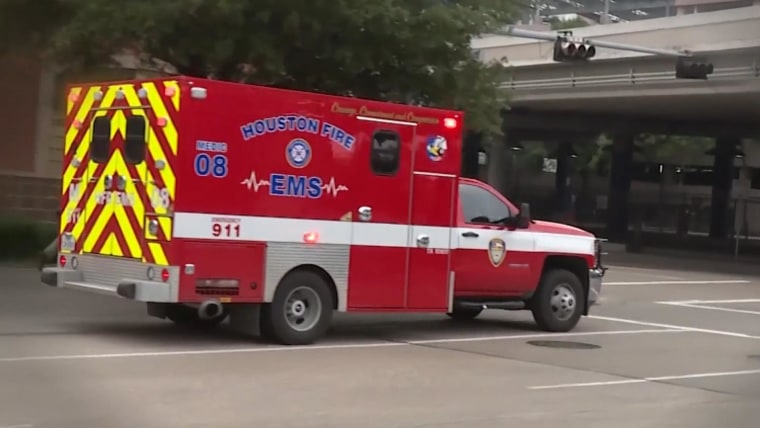HOUSTON – One year ago this month, Bill Loveday poured his family’s life savings into opening Bacaro Kitchen and Wine Bar, a restaurant that he hoped he might one day pass down to his children.
“We decided rather than retirement, we would put our money into creating this brand,” Loveday, 59, told NBC News.
But this spring, the Lovedays shuttered along with other restaurateurs when statewide stay-at-home orders were issued in March. They opened for takeaway in May and had just started to welcome diners indoors when they were forced to make the difficult decision to close the small Italian bistro in late June as COVID-19 began ravaging Texas. Now, with his emergency coronavirus funding from the government through the Paycheck Protection Program spent, Loveday must decide whether he can afford to keep paying his staff or close his doors for good.
“I don’t see any light at the end of the tunnel right now,” he said.
That’s in no small part because Texas’ virus numbers are among the most worrisome in the country. The state reported a record 10,028 positive COVID-19 cases Tuesday, and 9,952 cases Wednesday, with more than 9,000 people hospitalized with the virus. With almost 100 deaths, Wednesday was the state’s deadliest day since the coronavirus outbreak began.
“This surge has everybody concerned, so it’s very difficult to get any business,” Loveday said. “Really, pessimistically, if we don’t have some kind of dramatic help — right now — we’ll have to close the business.”
As both state and local officials urge people to voluntarily stay home across Texas, many restaurants and businesses that had finally opened up mere weeks ago have been thrown into a financial limbo. Texas may be feeling the crisis most acutely right now, but restaurant owners across the country are urging Congress to pass the bipartisan Real Economic Support that Acknowledges Unique Restaurant Assistance Needed to Survive Act of 2020, or RESTAURANTS Act, that would provide a $120 billion fund for struggling small businesses and reemploy 11 million workers. The bill would also provide special relief for minority business owners who have struggled to receive PPP loans.
“If you’re telling us not to close, but telling people they shouldn’t go out, there has to be some help for that,” Chris Shepherd, 47, chef and owner of Underbelly Hospitality, a restaurant group, said.
Shepherd, who owns four restaurants across Houston, says he did everything the government told him to do, including applying for the PPP loan and rehiring 100 percent of his staff back once he received the funding. He’s managing to keep his businesses open with reduced seating, and takeout orders, but he is making less than a third of the profits he saw this time last year.
As COVID-19 cases in Texas spike, Shepherd says elected officials have left restaurant owners in an impossible position – they can care for their own financial viability, or the health of their staff, but not both.
“I wish I could temporarily close all my restaurants to ensure the safety of everyone on my staff. I don’t want to be part of the problem,” Shepherd wrote Sunday in an op-ed published on NBC affiliate KPRC’s website. “But without support from the government, I don’t have the resources to shut down and wait this crisis out. If I shutter my restaurants now, none of them are coming back.”
Texas Gov. Greg Abbott said this week that going back into “lockdown mode,” as some local leaders have suggested, would “force Texans into poverty.” Business owners say that’s the wrong calculation – lockdown can happen, but only with more relief funding.
“The virus affects small businesses the way it affects the body,” said Marcus Davis, the owner of various restaurants in Houston including The Breakfast Klub. “It infects it, it constrains it, it makes the business ill, it puts it on a ventilator, it makes it tough for the business to breathe and it can endanger the life of the business,” he said. The Breakfast Klub, in normal years, is a favorite stop on the presidential campaign trail, and a haunt of celebrities. The eatery usually has a line of customers wrapped around the block.
That’s not true during the pandemic.
Davis was reluctant to reopen his restaurants for in-person dining and bring his employees back for fear that he may have to let them go again. Even now, as he’s reopened with limited capacity, he says he may soon shutter once more. For him, closing may mean more than staying open.
“It means that I have a healthy staff who are free from the possibility of contracting [the virus] from interacting with guests. It means that I get to go home to my 70-plus-year-old mother and not be concerned about taking the virus home to her. It means that I get to go home to my diabetic daughter and make sure that I’m not taking it home to her,” he said, adding he is also concerned about keeping customers safe.
Loveday agrees, which is why he, too, has chosen to remain closed for weeks. But he has been reduced to pillaging savings to stay afloat. As he scrambles to negotiate with the landlord to keep his business, he wonders how long he’ll be able to keep his staff and how long before help arrives.
“We’re trying everything that we can,” he said. “It seems to me there’s always a way.”












